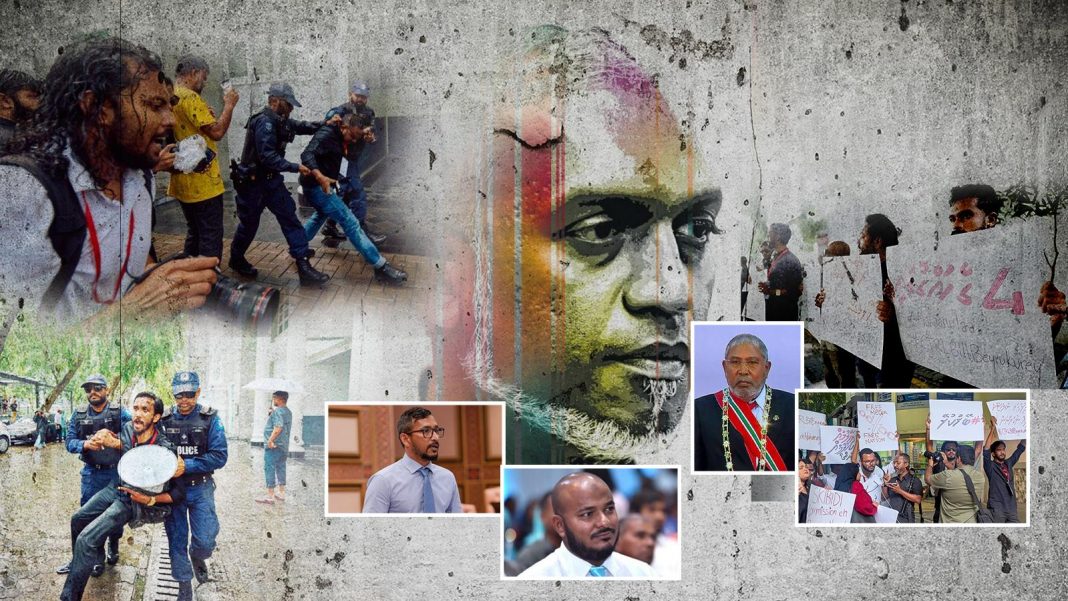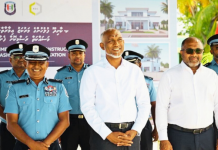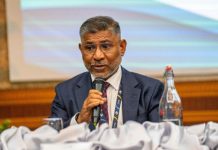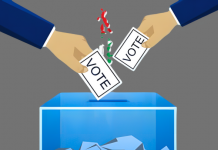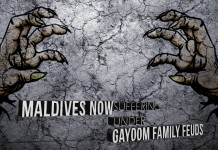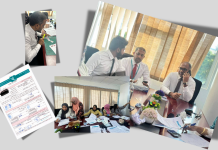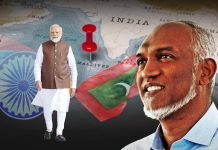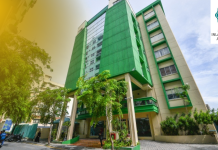President Mohamed Muizzu’s government spent the month of August deep in controversy. From shady appointments and nepotism to silencing journalists and hiding state spending, every week brought new scandals. Here’s a detailed look at the major developments of the month — Muizzu’s “August Report Card.”
1. Politics in the Courts: JSC Picks PNC Activist for High Court
The Judicial Service Commission (JSC) shortlisted Mohamed Shaheed, a senior activist of the ruling PNC and former Deputy Minister at the Homeland Security Ministry, for one of two vacancies at the High Court. Instead of appointing an experienced legal professional with independence, the government is pushing a loyalist into the judiciary — undermining the court’s credibility and proving that political influence now runs deep in the justice system.
2. Dollar Crisis Deepens: USD Black Market at MVR 20.34
The dollar crisis worsened in August, with the black-market exchange rate hitting MVR 20.34. This reflects the public’s loss of confidence in the government’s ability to manage the economy. As reserves shrink and imports rely heavily on USD, ordinary Maldivians are paying the price of financial mismanagement.
3. FIU Head Fired After Leak Exposing Ruling Party MP
Abdulla Ashraf, head of the Financial Intelligence Unit (FIU), was sacked a day after one of its confidential reports leaked on social media. The report flagged suspicious financial transactions linked to Ibrahim Shujau, a senior PNC MP. Instead of investigating the MP, the government punished the messenger — raising serious concerns about cover-ups to protect ruling party elites.
4. Nepotism at MIRA: President’s Pick Is a PNC MP’s Son
President Muizzu’s top choice for a seat on the board of the Maldives Inland Revenue Authority (MIRA) is Mohamed Imthinan, son of ruling party MP Saudhulla Hilmy. Once again, family connections and political loyalty are valued above merit or experience, turning one of the country’s most important tax bodies into a family club.
5. Government Stops Revealing Muizzu’s Travel Costs
In December 2023, President Muizzu promised that his office would disclose all expenses for his foreign trips, claiming it was about “transparency.” By August 2024, those disclosures stopped completely. The silence raises questions: what is the government hiding? How much taxpayer money is being spent on Muizzu’s frequent overseas tours?
6. Media Control Bill: An Attack on the Free Press
A new media control bill introduced in parliament imposes harsh fines on journalists and news outlets, ranging from MVR 5,000 to MVR 100,000. Critics say the bill is designed not to regulate the media but to silence it. For a government that promised accountability, this move is a direct assault on free speech and democracy.
7. Murder Suspect Exposed as Political Appointee
One of the suspects arrested in connection with the brutal killing of Abdul Rahman Adam in Alif Alif Maalhos turned out to be a political appointee of the current government. This revelation highlights how unqualified political appointees are being placed in sensitive roles, sometimes even linked to serious crimes.
8. Channel 13 Silenced: BroadCom Blocks Opposition Coverage
The Broadcasting Commission of Maldives (BroadCom) ordered Channel 13 to stop broadcasting a live rally by former President Abdulla Yameen. By shutting down coverage of the opposition, BroadCom — under heavy government influence — is now openly acting as a political tool to protect Muizzu and his party.
9. Social Media Activist Arrested Over Tweet
In August, activist Anim Mufeed was arrested for a post on Twitter exposing corruption in the Muizzu administration.This is a clear example of authoritarian tactics used to silence dissent.
10. Fraudster Rewarded: Nafiu Appointed to HDC
Abdul Nafiu Mohamed, accused of involvement in a fraud case linked to Hulhumalé’s luxury K Park Residence project, was appointed as a director of the Housing Development Corporation (HDC). Instead of being investigated, Nafiu has been rewarded with a powerful post — another case of corruption being swept under the rug.
11. Fake “Financial Coup” Case Stalls
One year after the government claimed the Bank of Maldives (BML) conspired with the opposition MDP to destabilize Muizzu’s rule, the police have found no evidence. The so-called “financial coup” looks increasingly like a fabricated story used to smear the opposition and justify tighter government control over institutions.
12. Journalists Arrested, Government Lies About It
When journalists protested against the media control bill in August, police arrested three of them. Afterwards, both police and the government denied any arrests took place. But photos and videos of the arrests flooded social media, exposing yet another lie. This government is not just targeting the press — it is openly deceiving the public.
13. PNC Leader Calls for Violence Against Journalists
In parliament, PNC parliamentary leader Ibrahim Falah shockingly declared that journalists should be “impaled” during the debate on the media control bill. Despite outrage, Falah has refused to apologize. Such violent rhetoric from a ruling party leader shows the contempt Muizzu’s government holds for the press.
14. Health Centres Turned Into Political Outposts
Reports confirmed that the government is quietly appointing ruling party activists to island health centres ahead of next year’s local council elections. Public health services are being politicized, and qualified professionals are being sidelined in favor of campaign loyalists.
15. Fired for Defending Journalists
Ibrahim Saeed (Cade), Political Director at the Ministry of Sports, was sacked in August after he publicly criticized Ibrahim Falah’s violent comments and stood against the media control bill. His dismissal shows that even ruling party insiders are punished if they dare to speak the truth.
16. Villa Air Rewarded Despite Failed Airport Project
The government decided to hand MVR 18 million in “compensation” to Qasim Ibrahim’s Villa Air, despite the company failing to deliver on its promise to develop Kaadedhdhoo Airport into an international facility. Instead of holding Villa Air accountable, the Muizzu administration is rewarding failure and letting powerful businessmen off the hook.
A Month of Failure
August shows the truth about President Muizzu’s government. Jobs go to family and loyalists, corruption goes unpunished, and anyone who speaks out — journalists, activists, or whistleblowers is silenced.

